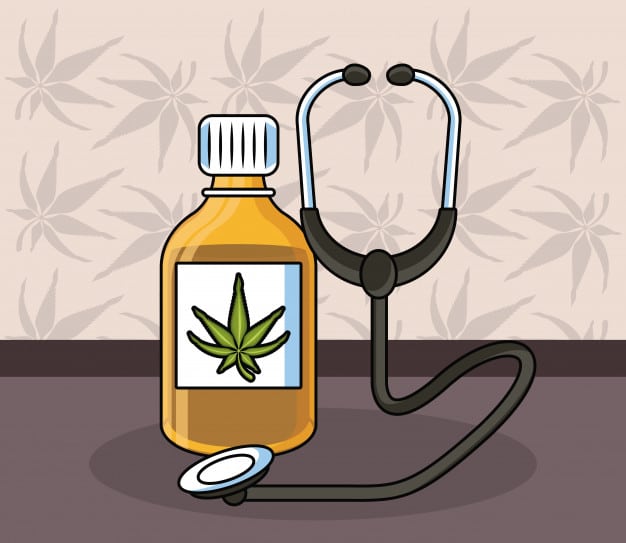CBD is being put in everything from grape soda to skin cream these days. We AGEISTs are sensible people, and we thought, “Is this just people looking for a new mellow, the newest marketing health fad, or is it really a useful compound?” We thought it would be good to find out what our science expert, Mike James, PhD would find. His references are at the bottom of the post. Spoiler alert: the science is sketchy. Anything around this topic can be a hot button, so let’s continue the conversation in the comments.
Just so we are clear, CBD and THC are Cannabidiol and Δ9-tetrahydrocannabinol, and both components of hemp and marijuana. CBD is the non-psychoactive chemical that has garnered a great deal of recent interest in the scientific and popular press for a number of uses (see below).
What are the potential uses for CBD? What’s the evidence for them?
The list of proposed uses for CBD is very long. In two recent surveys, 38-55% of CBD users reported that they use it for relaxation or general health. In both studies, the group of CBD users with a specific therapeutic target cited at least fifteen different medical conditions. The most common medical conditions cited in these surveys for the use of CBD were pain, anxiety, depression, and insomnia. As with many dietary supplements, use for these conditions is generally based on animal studies, case reports, and/or small clinical studies. Let’s take a look at the evidence for the usefulness of CBD for these top five conditions plus a few others.
Epilepsy
As an aside, there is a prescription-only oral form of cannabidiol, Epidiolex®. This form of CBD has been approved by the FDA for two rare types of epilepsy (Lennox-Gastaut syndrome and Dravet syndrome). FDA approval requires proof of effectiveness in well-designed clinical trials.
Anxiety
The effects of CBD in animal models of anxiety provided a strong case for studying CBD in clinical trials, however, the results in human trials have been mixed. Several studies used THC as the anxiety-inducing stimulus, which may not be a good representation of anxiety produced under other conditions. Most of the studies were single-dose studies and would be of limited value in assessing the long-term effectiveness of CBD for anxiety. Bottom line: more studies are needed to evaluate the use of CBD for anxiety.
Pain
CBD and the combination of CBD and THC have shown some effects on pain models in animals. Evidence of the effectiveness of CBD alone on pain in humans is lacking. A study of a combination of THC and CBD for treatment of pain due to nerve damage induced by cancer chemotherapy yielded positive results. The use of a combination of CBD and THC without a comparison to each agent alone makes interpretation of these results difficult. A comparison with the individual components would have allowed a determination of whether the effects were due to THC or CBD or unique to the combination of the two.
Depression
The evidence for usefulness of CBD for depression seems to be based solely on pre-clinical (animal) data. A 2017 review of the use of CBD in psychiatry found no clinical evidence for the use of CBD in major depressive disorders. A current search of PubMed and clinicaltrials.gov (April 2019) also failed to find any clinical studies demonstrating the usefulness of CBD for depression.
Insomnia
A single small study (15 subjects) of the effects of CBD on insomnia showed that CBD at the highest dose tested (160 mg) had a positive effect on the subject’s reported sleep duration but no effect on sleep induction. More studies are needed to draw a definitive conclusion about the effects of CBD on insomnia.
Acne / Inflammatory Skin Conditions
There is some evidence in human skin cells that suggests CBD may be useful in the treatment of acne. The effectiveness of CBD against acne in clinical trials remains to be determined. A small retrospective study showed a subjective improvement in inflammatory skin conditions (acne and psoriasis) and scarring. The topical ointment in this study included several natural ingredients in addition to CBD and did not include a control group (ointment without CBD). These factors make it difficult to attribute the observed effects to CBD.
Other Uses
A small clinical trial suggested that CBD may be useful in treatment of opioid-seeking behavior in heroin addicts. Other studies have suggested that CBD may be useful in treating nicotine and marijuana dependence. Clinical trials in larger populations will be required to confirm these preliminary studies. A small, single-dose study showed a decrease in resting blood pressure and decreases in the elevation of blood pressure in response to exercise and cold stress. Further studies are required to determine the significance of this effect.
What’s the downside of using CBD?
In the clinical trials for the prescription form of oral CBD, the most common side effects were drowsiness, decreased appetite, diarrhea, and an increase in transaminase levels in the blood. Transaminases are liver enzymes normally found in low levels in the blood. Elevation of transaminase levels can indicate damage to the liver. Anyone with known liver disease should consult his or her physician prior to using CBD.
Other commonly observed side effects were generalized weakness, trouble sleeping, and infections. Due to the effects of CBD on alertness, caution should be exercised when driving or performing other tasks requiring concentration after use of CBD.
In addition, due to the way oral CBD is broken down in the liver, it can potentially interact with a number of drugs, so check with your pharmacist if you decide to start taking CBD. Another note of caution: animal studies indicated that CBD may be harmful to a developing fetus. No data is available regarding the effects in pregnant women, therefore use of CBD during pregnancy or lactation should be discussed with your physician.
Can CBD be abused?
CBD did not produce drug-seeking behavior in animals or subjective effects similar to THC in humans. There was also no evidence for dependence after 28-day dosing with CBD in humans.
How is CBD taken?
CBD is available as an oil, in capsules, as a sublingual tincture (an alcohol-based solution dropped under the tongue), cartridges for vaping pens, edibles and topical creams. Making definitive statements about dosing is difficult for two reasons: 1) The actual amount of CBD in these products is highly variable, and 2) the clinical data for most of the proposed uses of CBD is scarce. In addition, these data were frequently derived from studies that involved only one or two dose levels, so complete dosing information is not available. As I have said before, when it comes to dietary supplements (and medications), more does not equal better. Use the lowest-effect dose to decrease the chances you will have unwanted side effects. Concerning selection of a particular product if you choose to use CBD, my advice is to choose a domestic manufacturer that complies with the FDA’s Good Manufacturing Practices (GMPs), if possible.
Should I use CBD?
Outside of the prescription-only CBD product approved for two specific, rare forms of epilepsy in children, the current clinical evidence for the use of CBD is sketchy. Given the potential side effects and drug interactions, it is difficult to rationalize the use of CBD at this time. Pharmacokinetic studies have shown that a significant amount of CBD can be absorbed into the bloodstream after application to the skin, so even topical application of CBD products may have adverse effects. Bottom line: more clinical research is needed to determine the potential benefits of CBD.
Another issue complicating the use of CBD products by the public is their uncertain legal status. The Hemp Farming Act of 2018 legalized the growing of hemp in the US. The Hemp Farming Act was passed as part of the larger farm bill The Agricultural Improvement Act of 2018. However, in April of 2018, The 9th District Court of Appeals ruled that CBD is a Schedule I controlled substance under federal law (meaning it has abuse potential and no recognized medical use). Schedule I controlled substances are subject to very strict regulation by the DEA and the FDA. CBD is legal under state law in the states that have legalized medicinal or recreational marijuana use. However, this month (May 2019), the Health Department of the State of Hawaii issued a statement that sales of CBD products to anyone other than a medical marijuana cardholder was illegal. The FDA and various states are working to develop regulations governing sales and safety monitoring for CBD products.
If I use CBD, will it show up in a urine test for marijuana use?
Urine tests for marijuana are actually detecting a metabolite (breakdown product) of THC. The most commonly used tests should not detect CBD. In addition, all CBD products must contain less than 0.1% THC, so CBD products produced in compliance with applicable regulations should not produce positive results on urine drug tests for marijuana.
Besides some small studies, there doesn’t seem to be much upside to CBD. Why is it everywhere?
Just to be clear, I am not categorically saying that CBD does not produce any of these effects. I am saying that clear clinical evidence for most of these claims is currently lacking. In addition, the placebo effect is very real and may account for some of these observations.
SELECTED REFERENCES:
Popular press:
Avins, J. Does CBD actually work? Quartzy 17Apr2019 qz.com/quartzy/1597088/does-cbd-work-a-comprehensive-look-at-its-most-popular-uses/. Accessed 5May2019.
2018.2667 (115th): Hemp Farming Act of 2018. govtrack.us/congress/bills/115/s2667. Accessed 5May2019.
Thompson, D. CBD oil: All the rage, but is it safe and effective. Web MD 7May2018 webmd.com/pain-management/news/20180507/cbd-oil-all-the-rage-but-is-it-safe-effective#1. Accessed 5May2019.
Hawaii Reiterates That CBD Still Illegal for Most People. US News & World Report. 3May2019. usnews.com/news/best-states/hawaii/articles/2019-05-03/state-defines-sale-manufacturing-of-cbd-illegal-in-hawaii. Accessed 5May2019.
Valasquez-Manoff, M. Can CBD really do all that? The New York Times Magazine 14May2019. https://www.nytimes.com/interactive/2019/05/14/magazine/cbd-cannabis-cure.html?action=click&module=Top%20Stories&pgtype=Homepage Accessed 21May2019.
Wallace, A. DEA’s rule on cannabis extracts will stand, federal judges say. Denver Post 2May2018. denverpost.com/2018/05/02/cannabis-extracts-schedule-i-classification/ Accessed 5May2019.
Williams, RA. CBD oil: Leading patients to safe use. Pharmacy Today 24:40 (2018). Accessed 2Jun2019.
Selected References:
Bartner, et al. Pharmacokinetics of cannabidiol administered by 3 delivery methods at 2 different dosages to healthy dogs. Canadian J Vet Res 82:178-183 (2018).
Blessing, EM et al. Cannabadiol as a potential treatment for anxiety disorders. Neurotherapeutics 12:825-836 (2015) DOI 10.1007/s13311-015-0387-1.
Bonn-Miller, MO et al. Labeling accuracy of cannabidiol extracts sold online. J Am Med Assoc 318:1708-1709 (2017).
Carlini, EA and Cunha, JM. Hypnotic and Antiepileptic Effects of Cannabidiol. J Clin Pharm 21:417S-427S (1981). DOI 10.1002/j.1552-4604.1981.tb02622.x
Coroon, J and Phillips, JA. A cross-sectional study of cannabidiol users. Cannabis and Cannabinoid Res 3.1: 152-161 (2018).
DiMarzo, V. Targeting the endocannabinoid system: to enhance or reduce? Nature Rev Drug Discovery 7:438–455 (2008). https://doi.org/10.1038/nrd2553
Epidiolex® (cannabidiol) Full Prescribing Information. Greenwich Biosciences, Inc., Carlsbad, CA December 2018.
Hurd, YL et al. Early phase in the development of cannabidiol as a treatment for addiction: Opioid relapse takes initial center stage. Neurotherapeutics 12:807-815 (2015). DOI 10.1007/s13311-015-0373-7
Jadoon, KA et al. A single dose of cannabidiol reduces blood pressure in healthy volunteers in a randomized crossover study. JCI Insight 2:e93760 (2017). DOI 10.1172/jci.insight.93760
Khoury, JM et al. Is there a role for cannabidiol in psychiatry? World J Biol Psychiatr 20:101-116 (2017) DOI 10.1080/15622975.2017.1285049.
Lynch, ME, et al. A double-blind, placebo-controlled, crossover pilot trial with extension using an oral mucosal cannabinoid extract for treatment of chemotherapy-induced neuropathic pain. J Pain Symp Mngmt 47:166-173 (2014). DOI 10.1016/j.jpainsymman.2013.02.018
Oláh, A. et al. Cannabidiol exerts sebostatic and antiinflammatory effects on human sebocytes. J Clin Invest 124: 3713-3724 (2014) DOI 10.1172/JCI64628
Pertwee, RG. The diverse CB1 and CB2 receptor pharmacology of three plant cannabinoids: Δ9-tetrahydrocannabinol, cannabidiol and Δ9-tetrahydrocannabivarin. Br J Pharmacol 153: 199–215 (2008) DOI 10.1038/sj.bjp.0707442
Piermarini, C and Viswanath, O. Letter: CBD as the new medicine in the pain provider’s armamentarium. Pain Ther (2019) DOI 10.1007/s40122-019-0117-1.
Zhorinsky, S and Potvin, S. Cannabidiol in humans – The quest for therapeutic targets. Pharmaceuticals 5:529-552 (2012). DOI 10.3390/ph5050529



